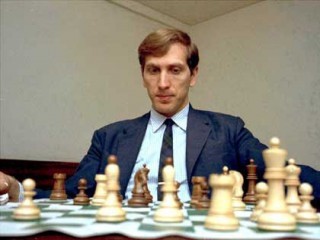
Bobby Fischer biography
Date of birth : 1943-03-09
Date of death : 2008-01-17
Birthplace : Chicago, Illinois, USA
Nationality : American
Category : Sports
Last modified : 2010-09-12
Credited as : Chess player, champion,
0 votes so far
Early years
Bobby Fischer was born in Chicago, Illinois, on March 9, 1943. His father was a physicist (scientist who studies matter and energy), and his mother, Regina Fischer, worked as a teacher and a nurse. His parents divorced when he was two years old, and he moved to Brooklyn, New York, with his mother and older sister in 1948. Fischer began playing chess at age six, when his sister bought a set and they both learned how to play. By age eight Fischer was competing and receiving lessons at the Brooklyn Chess Club.
Chess success
Fischer rose quickly through the junior ranks of chess players, and at age thirteen he won the United States Junior Championship, the youngest player to date to have taken the title. Competing against adults, Fischer won the United States Open Championship at age fourteen. He dropped out of Erasmus High School in Brooklyn at age sixteen to concentrate on chess. By the next year he became a challenger for the world title and the youngest player ever to receive the title of international grand master. But Fischer was often uncooperative and badly behaved. He would cancel out of matches unexpectedly, and he held grudges that lasted for years. He withdrew from international competition for five years during the 1960s.
By 1970 Fischer had made a comeback and had built up enough tournament credits to take on the current world champion, the Russian Boris Spassky. In 1972 the arrangements were made for the match to be held at Reykjavik, Iceland, and chess fans were excited about this historic challenge. As the event drew near, though, Fischer continued to behave so oddly that many worried he might not show up for the match. Even after his last-minute arrival, Fischer complained constantly and insulted the country and its people. Still, Fischer beat Spassky and became world champion.
Oddball beliefs
Fischer's life after that historic match was marked by a period of nearly twenty years during which few heard from him. He lost the world title after refusing to accept the challenge of Anatoly Karpov in 1975. In 1981 he was arrested because he looked like a bank robber the police were chasing. After spending a night in jail, Fischer wrote a rambling pamphlet titled I Was Tortured in the Pasadena Jailhouse.
Fischer also demonstrated many offbeat beliefs. For example, though his mother was Jewish, Fischer maintained strongly antiSemitic (opposed to Jewish people) views. He also distrusted doctors, thought that the Russian government was out to kill him, and, according to an article in Maclean's, he had his dental fillings replaced "because he feared that Soviet (Russian) agents might be able to transmit damaging rays into his brain through the metal in his teeth."
Later years
In 1992 Fischer agreed to take on Spassky again for $5 million in prize money. The match was planned for the town of Sveti Stefan, in a region of the Yugoslav republic near the former republic of Bosnia-Herzegovina, which had recently been at war. At that time U.S. president George H. W. Bush (1924) had imposed sanctions (the refusal to do business with a group in order to get that group to change its policies) on Yugoslavia. This meant that by playing in the match Fischer would be breaking the law. At a press conference, Fischer spat on a letter from the U.S. Treasury Department that threatened him with fines and imprisonment if he played. The match, which ended in fifteen draws, showed that Fischer was still a skilled player. When the U.S. government brought charges against Fischer in December 1992, he chose to stay in eastern Europe.
By the mid-1990s Fischer, the author of several chess books and the inventor of a chess timing clock, was living in Budapest, Hungary, with a nineteen-year-old girlfriend, Hungarian chess star Zita Rajcsanyi. In 1999 he gave an interview to a Hungarian radio station in which he complained about Jews. In 2001 there were reports that Fischer was playing chess on the Internet under a different name.
















